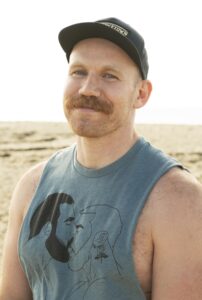Benjamin Weinryb Grohsgal of Philadelphia, New York City, and Provincetown died on July 13, 2024 after a year-long battle with glioblastoma. A scholar, linguist, software engineer, and artist, he was profiled in the Independent last October after losing mobility on the right side of his body and teaching himself to create digital art with his left hand. He was 37.

Benji was born in Philadelphia on Oct. 12, 1986 to Bruce Grohsgal and Joan Weinryb. He graduated in 2004 from Lower Merion High School, where he distinguished himself in studio art, math, and science. He went to Columbia University, where he created sets for university theater productions, carrying whole sheets of plywood home on the subway. He was a regular cartoonist for the Columbia Daily Spectator. He earned a bachelor’s degree in architecture in 2008.
During and after college, Benji set out to see and change the world. He went to Chandigarh, India to study Punjabi as part of the U.S. State Dept.’s Critical Language Scholarship Program. He received a fellowship in Bengali language and literature at the American Institute of Indian Studies in Kolkata in 2008 and a Fulbright fellowship for research in Bangladesh in 2010. He spoke Bengali, Punjabi, Hebrew, and Arabic, and he worked and volunteered for organizations combating HIV and homelessness, including Habitat for Humanity/AmeriCorps VISTA and Solidarity and Action Against the HIV Infection in India.
His travels and work sparked an interest in government and urban innovation. In 2014, he received a master’s degree in public policy from the Harvard Kennedy School and a master’s in urban planning from the Harvard Graduate School of Design. During graduate school, he worked in the San Francisco Mayor’s Office of Civic Innovation and as a Harvard Ash Center Fellow. His research centered on using data to improve urban design, public policy, and neighborhood transformation. He went on to work as a software engineer for a series of startups, including BuzzFeed, Citizen, and Scout.
Benji split his time between New York, Provincetown, and, eventually, Philadelphia. He reveled in Provincetown’s LGBTQ and artistic communities. He showed his artwork in several local galleries and designed floats for the Provincetown Carnival parade, including the award-winning octopus float.
“Benji’s greatest quality was his playfulness and curiosity,” said his friend Todd Flaherty. “It touched everyone in Provincetown. His warm and often silly demeanor kept people from understanding the depths of his intellect — and he liked that.”
Though he lived in Provincetown for less than four years, “he became an integral part of the community here,” said Brian Walsh. “He had a naturally open and welcoming personality that lent itself to fast and deep friendships. Benji was in on the joke of life — that it is important and precious, but that it should not be taken too seriously.”
“Benji brought an astounding amount of whimsy to a town that’s already known for it,” said another Provincetown friend, Harrison Fish. “What I learned from Benji was to go out of your way and take the time to see the weird things the world has to offer — and bask in your own weirdness.”
After his disease robbed him of the use of his right hand and arm, Benji continued to make art using only his left hand. In the month before his death, he had a show at the Provincetown Commons, which he was pleased to be able to attend. An exhibition of his work is scheduled at Studio Lacombe in Provincetown in August.
Benji lived passionately, jumping into everything with both feet. He was charmingly funny, with a humor that was sometimes acerbic but always good-natured. He loved music, dancing, and being with people. An avid athlete, he ran cross-country in high school and embraced fitness for the rest of his life. When he could no longer use the right side of his body, he set his mind to strengthening the left. He regained enough strength to take hikes and walks and even play frisbee and soccer shortly before his death.
His endeavors included learning how to create Buckminster Fuller-inspired geodesic domes, building a hammered dulcimer when he wanted to learn to play one, and traveling. Benji tried to help people get where they wanted to go and be the best versions of themselves.
“There really was no one quite like Benji,” said Todd Flaherty. “His loss is devastating, but his legacy will live on in our community for years to come.”
Benji is survived by his parents, Joan and Bruce; siblings Leah and Dov; niece Eliza; a grandmother and a great aunt; uncles, aunts, and cousins; and many other family members and friends.
In lieu of flowers, the family requests that contributions in Benji’s memory be sent to Dr. Stephen Bagley and Dr. Michelle Alonso-Basanta, Penn Brain Tumor Center or to the Provincetown Commons.



